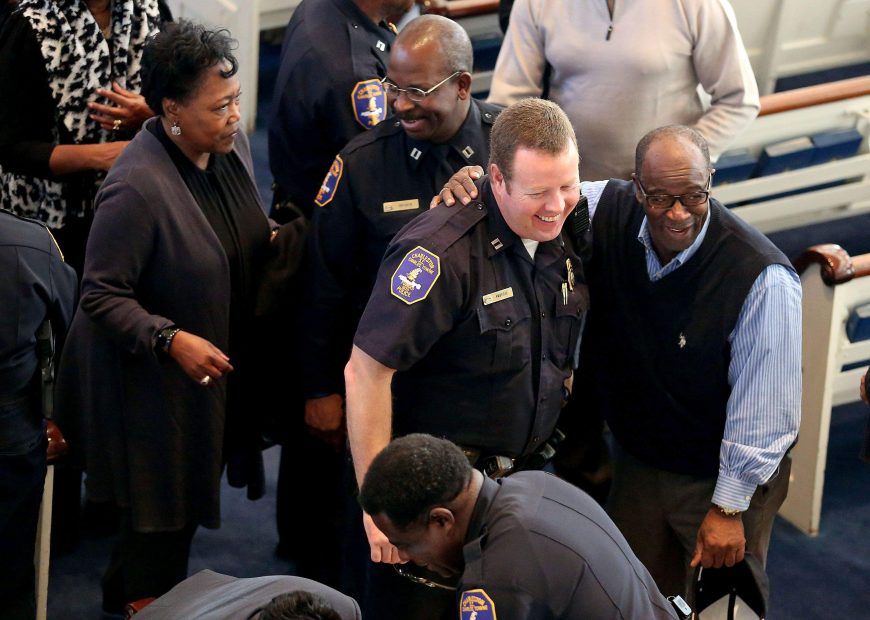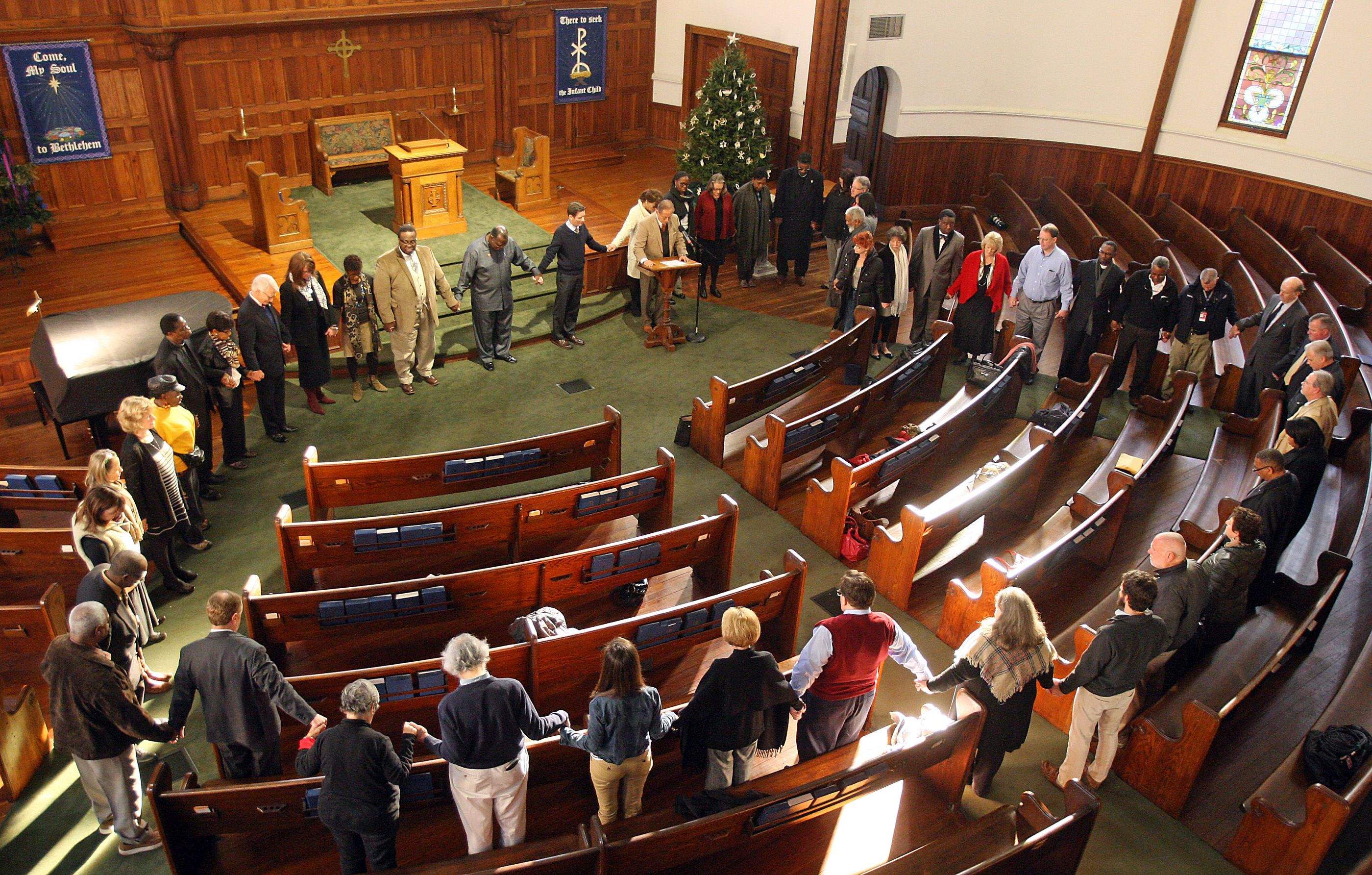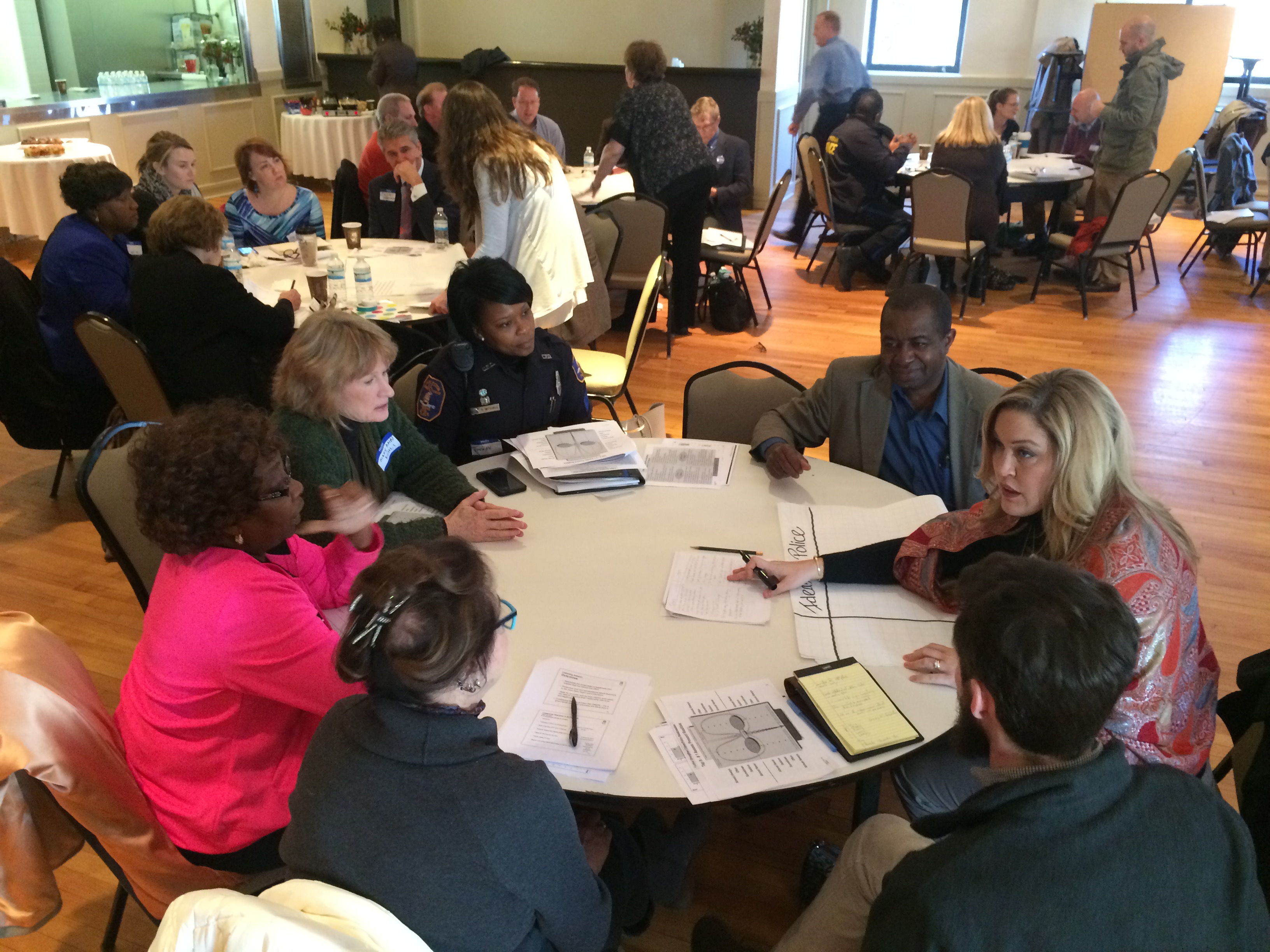The Illumination Project’s 13-month journey is illustrated below. However, if an Illumination Project is to realize its full potential, it needs to become a regular way of working and living in your community. When it becomes this type of ongoing process you will both have completed your work and at the same time ensured the work to create a healthy community will never end.
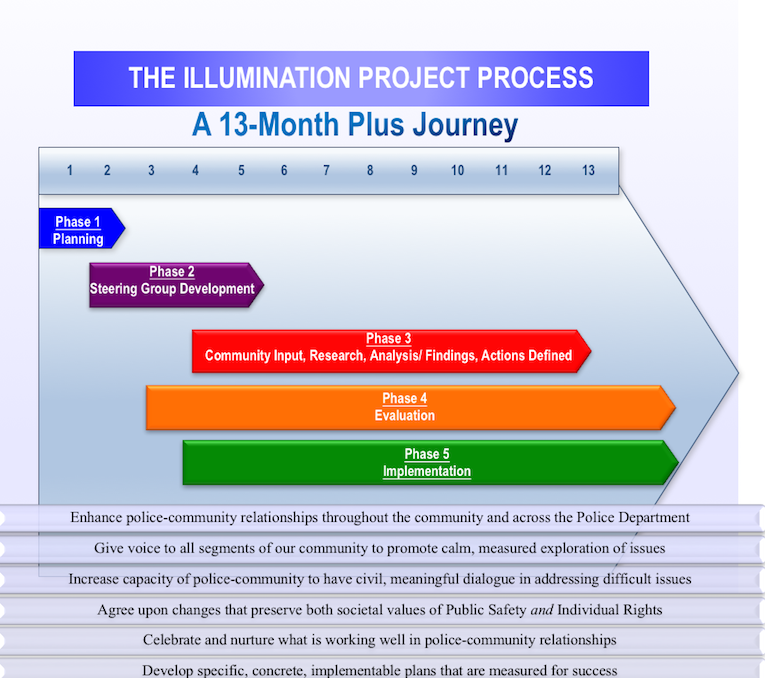
PHASE 1: PLANNING AND DEVELOPING THE PROJECT
The project’s purpose, desired outcomes, and a suggested scope of work are drafted by consultants and a Project Team of leaders. The two groups reach agreement on these elements as well as key engagement strategies (which later will come to be know as the Listening Sessions), resources needed, and a draft Polarity Map(s) focused on leveraging the key tension(s) impacting the community’s health.
We take guidance from the work in Charleston, our first “Illuminated City.” The map below show the tensions in Charleston between Public Safety AND Individual Rights.
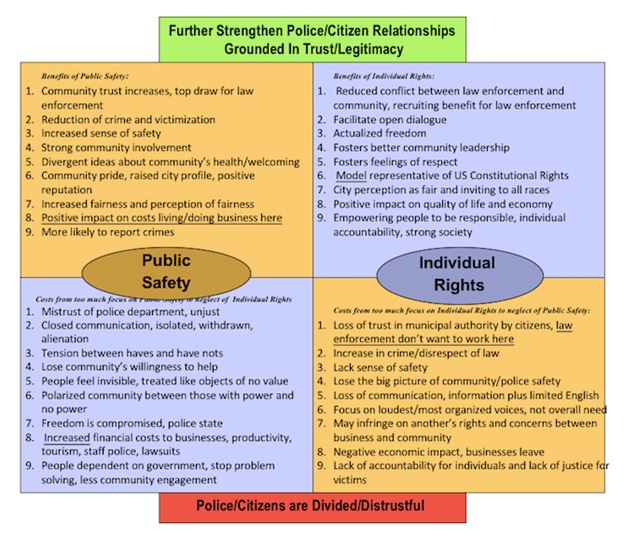
PHASE 2: DEVELOPING THE STEERING GROUP
The Project Management Team identifies a Steering Group whose members are then invited by the mayor to serve a one-year term. This diverse group of key community stakeholders comes from neighborhoods, business, education, faith-based organizations, political leaders, LGBTA groups, law enforcement, media and others. Using the principles of Polarity Thinking, the Steering Group refines the project purpose drafted in Phase 1 and explores the inherent tensions between healthy community values. The values below were excerpted from the Charleston effort.
- Public Safety And Individual Liberties
- Respect for Law And Respect for People
The Steering Group’s preliminary work opens a dialogue that serves as a microcosm of the public sessions to come later in the process. These community leaders guide the process development as we learn together about who should create and how to create an approach that would work for citizens throughout the city.
PHASE 3: LEARNING FROM THE COMMUNITY AND COUNTRY; DEVELOPING THE PLAN
Phase 3 entails the most intensive work . People need to be recruited to attend the Listening Session public gatherings and participate in them. Learning is also gathered from other cities and national studies. The phase concludes with developing a comprehensive plan and beginning to implement strategies from that plan.
The information below, again, was taken from the police/citizen relationship work in Charleston as an example.
NATIONAL STUDIES on IMPROVING POLICING
External information is included in developing the Strategic Plan. For example, in 2015 three major reports were published regarding community and police relations. Including these types of studies ensures best practices will be part of the ultimate plan.
Department of Justice Community Oriented Policing Services – 2015
- Explores opportunities to build trusting relationships between diverse communities and police.
- Explains importance of creating specific plans and programs directed toward education and understanding of different cultures.
Police Executive Research Forum – 2015
- Examines policies and procedures focusing on use of force.
- Challenges traditional training and tactics used by police.
- Explores the potential of new equipment to keep citizens and officers safe.
The President’s Task Force on 21st Century Policing – 2015
- Conducts a holistic review of current police administration and procedures to enhance trust and legitimacy.
- Examines the important roles of citizens/police partnerships to enhancing community policing, reduce crime, and increasing transparency/trust.
- Outlines the importance of training and education for citizens and police to increase understanding, improve communication and relationships, reduce tragedies, and enhance officer wellness and safety.
All information is reviewed and a comprehensive list is created of all recommendations made by all of the lessons learned. These recommendations are then compared to the community’s current police department practices. Then research is done to determine the progress the department is making on each recommendation.
Public Relations and Community Education
This work includes using social media, targeted marketing and clear messaging with the goal of every citizen in the community being aware of this effort, its goals, and how they can become involved. As well the Citizen Resource Group of community influencers is educated in Polarity Thinking, creating a large pool of people encouraging citizens to attend a Listening Session. These key stakeholders also then have the skills to engage others in the city in Polarity Thinking conversations.
Listening Sessions
The heart of The Illumination Project is these Listening Sessions, small group both/and conversations guided by Polarity Thinking between citizens and police. The purpose of these conversations is to gather ideas about what both police and citizens could do to improve their relationship. Active and persistent marketing of the Listening Sessions is a key to their success. Print media, radio interviews, in-person recruiting at city social events and social media all play a part. A “Bringing the Illumination Project to You” approach of holding sessions for any group that will host one is one of many examples of making it easier for people to have their voices heard. This experience, uncommon for many citizens when typically dealing with police or other public or private agencies, leads to many more people attending the sessions. This then results in broad-based support and engagement across the community.
Listening Sessions substantively improve the understanding and relationships between people — especially around difficult to discuss topics.
This substantive improvement happens through mindset change, behavioral change, and structural change.
These three types of change are significant, begin immediately, and stick.
Outcomes From a Listening Session
- Appreciate that there are many different leaders and supporters who are behind this effort.
- Have creative conversations where everyone in the room feels heard and understood.
- Develop specific actions that citizens and police can take to build trust, respect, and improve their relationships.
- Build confidence that the process is reliable and good things will result from it.
Developing a Comprehensive Plan to Further Strengthen Police and Citizen Relationships
A critical step in the process is translating as many as 2,000 or more ideas for improving the relationship into a clear, concrete, actionable and measurable plan. The Plan needs to identify goals, objectives, actions and measures of success. With early work done by a smaller group of consultants and key leaders, the entire Citizen Steering Group reviews, revises and ultimately approves the work that is then brought to the community at large. The purpose of this cycle back to the community is to have citizens help the Steering Group prioritize which actions will best to be taken first — a “Top Ten” Acts of Impact that will convince even the most skeptical that this time things may be different and isthe beginning of a better future for all.
The Charleston Illumination Project’s Strategic Plan has five goals that closely align with recent National Studies in effective policing. Each goal has objectives, strategies and measures of success. The five goals are listed below.
- Goal 1 | Different Cultures and Backgrounds: Develop better understanding between citizens and police of different cultures, backgrounds, and experiences to build mutually beneficial relationships.
- Goal 2 | Respectful, Trusting Relationships: Build a mutually respectful, trusting relationship between citizens and police.
- Goal 3 | Training Curriculum: Develop and implement a training curriculum to enhance citizen and police understanding of each other’s roles, rights and responsibilities.
- Goal 4 | Policies and Procedures: Develop and use best practices to improve citizen and police relationships through policies and procedures.
- Goal 5 | Community Policing: Expand the concept of community-oriented policing in all segments of our community.
Within these five goals, 86 strategies were identified to improve citizen and police relationships grounded in trust and legitimacy. Of these 86 strategies, 66 came from citizen Listening Sessions, 12 from National Study recommendations and eight from the Charleston police staff. Identifying these strategies began with the 858 citizens participating in Listening Sessions prioritizing their own ideas. From that list, the best ideas for police actions and citizen actions that would improve the relationship were suggested as priority ideas to the two leadership groups for the effort, the Citizen Steering Group and Community Resource Group. Ten of these ideas were translated into strategies and recommended for immediate implementation in 2016. Public written comment sessions refined the highest priority ideas and the leadership groups endorsed these revisions.
PHASE 4: EVALUATING THE PROJECT
The impact of The Illumination Project and citizen and police perceptions of each other are measured. There are also measures of success for each of the goals, objectives and actions in the Strategic Plan defined in Phase 3. Local colleges and universities can be excellent research partners for Illumination Projects. Both qualitative and quantitative data can be gathered on the effort, the more information gathered and analyzed, the more wisely future actions are taken.
PHASE 5: CREATING AN EVOLVING MODEL FOR THE REST OF THE NATION
On-going where/how/what lessons learned are shared with The National Illumination Project Learning Community. This includes marketing efforts to inform other cities of your Illumination Project’s approach, providing them with the tools and support needed to implement it, and creating a community of Illuminated Cities that will continue to learn from each other into the future.
